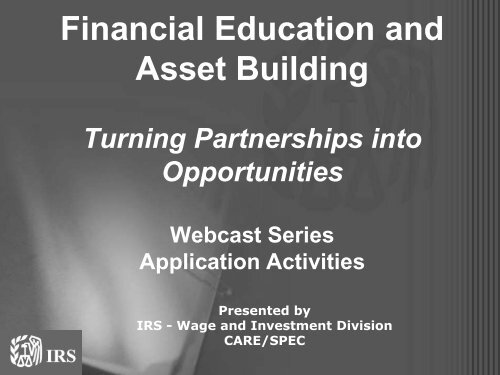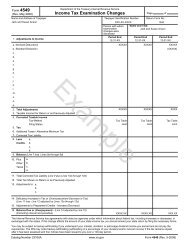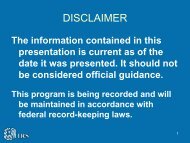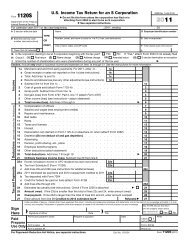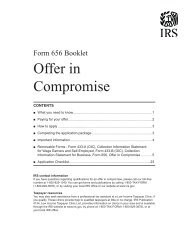Financial Education and Asset Building - IRS Video Portal
Financial Education and Asset Building - IRS Video Portal
Financial Education and Asset Building - IRS Video Portal
Create successful ePaper yourself
Turn your PDF publications into a flip-book with our unique Google optimized e-Paper software.
<strong>Financial</strong> <strong>Education</strong> <strong>and</strong><br />
<strong>Asset</strong> <strong>Building</strong><br />
Turning Partnerships into <br />
Opportunities<br />
Webcast Series<br />
Application Activities<br />
Presented by<br />
<strong>IRS</strong> - Wage <strong>and</strong> Investment Division<br />
CARE/SPEC
Shaina Gross<br />
Community Impact Manager<br />
United Way of San Diego <br />
County
Individual Development <br />
Accounts (IDA’s)
United Way of San Diego <br />
County<br />
Provides targeted funding in three areas:<br />
<strong>Education</strong><br />
Income<br />
Health<br />
4
United Way of San Diego County<br />
Performs community needs<br />
assessments to determine where<br />
UWSD funds can best be used to<br />
change the knowledge <strong>and</strong><br />
behaviors of our community<br />
members<br />
5
Getting involved in <strong>Financial</strong> Stability<br />
A group of community experts was<br />
convened to help UWSD determine<br />
where it should focus<br />
The initial focus was on adults who<br />
were EITC eligible<br />
6
Getting involved in <strong>Financial</strong><br />
Stability…cont’d.<br />
After a year of focusing on financial<br />
education classes, we began to get<br />
involved in funding of IDA programs<br />
We then exp<strong>and</strong>ed our efforts to provide<br />
financial education to underserved <strong>and</strong><br />
marginalized youth<br />
7
<strong>Financial</strong> Stability Efforts<br />
8
Individual Development Accounts<br />
Matched savings accounts that allow<br />
individuals to save toward a specific<br />
asset goal<br />
Depending on the source of funding,<br />
there are different saving assets goals<br />
a client can select<br />
9
Federal IDA Program<br />
There are Federal, <strong>Asset</strong>s for Independence <br />
(AFI) funds available to use as the match <br />
for an individuals’ saving<br />
Applying agency must have a “community”<br />
match in order to receive federal funds<br />
10
Federal IDA Program cont’d<br />
Household income of the participant must<br />
be less than twice the FPL<br />
Individuals can receive up to a 3:1 match,<br />
or up to $6,000 in match funds<br />
11
Federal IDA Program cont’d<br />
All money saved must be used for:<br />
Homeownership<br />
Secondary education or training<br />
Micro-enterprise<br />
12
Federal IDA Program cont’d<br />
UWSD funded the San Diego Housing<br />
Commission at $120,000 to help them<br />
secure $250,000 in federal funds<br />
The program is available to residents of<br />
the Commission’s housing developments<br />
13
Federal IDA Program - Results<br />
82 individuals participated with varied goals<br />
42 homeownership<br />
18 education<br />
12 small business goal<br />
10 more than one goal<br />
Participants have completed over 800 hours<br />
of financial education coursework<br />
14
Success Stories<br />
Martha – Used the IDA funds to pay for<br />
course work to earn her certificate in<br />
Translation <strong>and</strong> Interpretation. She<br />
accessed her IDA funds again to become<br />
a certified First Aide/CPR instructor, <strong>and</strong> is<br />
now building up her account again to start<br />
her own CPR Instructor business<br />
15
Success Stories…cont’d<br />
Dennis – He had a dream of starting his<br />
own contractor business. He has used his<br />
funds to pay for training to become a<br />
contractor, to obtain his contractor license<br />
<strong>and</strong> to buy uniforms for his business.<br />
16
Non-Federal IDA Program<br />
Because of the restrictions placed on the<br />
Federal AFI funds, some agencies choose<br />
to implement an IDA program without the<br />
use of Federal funds.<br />
17
Non-Federal IDA Program<br />
cont’d<br />
This allows them to be more flexible in the<br />
asset savings goals their clients can<br />
target.<br />
UWSD provided $65,000 in funding to the<br />
International Rescue Committee to<br />
implement an IDA program for its refugee<br />
clients<br />
18
Non-Federal IDA Program <br />
cont’d<br />
Participants may save for:<br />
Personal computer<br />
<strong>Education</strong><br />
Repay debt (often their refugee travel loan)<br />
Down payment on an automobile<br />
Micro-enterprise<br />
Credit building <strong>and</strong> credit repair<br />
Security deposit on an apartment<br />
19
Non-Federal IDA Program - Results<br />
45 individuals participated:<br />
23 purchase of a car<br />
9 are paying down debt<br />
5 education goal<br />
5 are paying immigration fees<br />
2 small business goals<br />
1 security deposit on a rental property<br />
20
Non-Federal IDA Program -<br />
Results<br />
88% of participants received one-on-one<br />
individual financial education services<br />
40% received employment training <strong>and</strong><br />
assistance in finding their first job<br />
21
Non-Federal IDA Program –<br />
Results…cont’d<br />
26% received free tax preparation services<br />
5% completed small business<br />
development coursework<br />
All clients received basic financial<br />
education covering budget, credit <strong>and</strong><br />
debt, <strong>and</strong> checking <strong>and</strong> savings<br />
22
Success Stories<br />
Oumar – Commuted 90 minutes each way<br />
every day to <strong>and</strong> from work using public<br />
transportation. In the evenings he<br />
attended ESL classes. With his EITC<br />
refund <strong>and</strong> his IDA savings he was able to<br />
purchase a reliable used car. He is now<br />
pursuing his GED <strong>and</strong> will then go on to<br />
accounting school.<br />
23
Success Stories…cont’d<br />
In a participant survey, individuals without<br />
a car reported a median travel time of 80<br />
minutes in each direction. This is 4 times<br />
as long as those individuals with a car,<br />
whose median commute was 20 minutes.<br />
24
Lessons Learned<br />
IDA accounts are a great motivation tool<br />
for individuals who are actively<br />
participating in financial education<br />
programs<br />
IDA accounts teach savings habits <strong>and</strong><br />
goal setting mentalities that stay with<br />
clients over the long-term<br />
25
Lessons Learned…cont’d<br />
Not all clients will be successful in an IDA<br />
program. Agencies need to carefully<br />
select those clients who are ready to set<br />
savings goals <strong>and</strong> work toward them<br />
IDA account management requires a<br />
dedicated (not necessarily full-time) staff<br />
person to monitor all deposits <strong>and</strong><br />
matches<br />
26
Contact<br />
Shaina Gross, MPH<br />
United Way of San Diego County<br />
sgross@uwsd.org<br />
858-636-4181<br />
27
CASH Coach Program
Monica Copel<strong>and</strong><br />
<strong>Asset</strong> Development <br />
Program Manager<br />
29
Mission<br />
Baltimore CASH Campaign pledges to:<br />
• Promote greater awareness of the EITC<br />
among low-income families,<br />
• Advance free tax preparation <strong>and</strong> the<br />
avoidance of unnecessary charges,<br />
• Incorporate the use of tax refunds as part<br />
of an overall asset-building strategy, <strong>and</strong><br />
• Advocate for working families in the<br />
Baltimore area.<br />
30
History<br />
• Formed in 2001, the Baltimore CASH (Creating <strong>Asset</strong>s,<br />
Savings, <strong>and</strong> Hope) Campaign is a coalition of<br />
• Community-based organizations<br />
• Workforce development agencies<br />
• Foundations<br />
• Businesses<br />
• City government<br />
• Internal Revenue Service (<strong>IRS</strong>)<br />
• <strong>and</strong> hundreds of volunteers<br />
• These partners joined together to implement strategies<br />
to increase economic opportunities <strong>and</strong> promote<br />
financial stability for low- <strong>and</strong> moderate-income<br />
working families<br />
31
• 20 free tax sites located<br />
throughout Baltimore City<br />
<strong>and</strong> Baltimore County<br />
• Eligibility: Taxpayers<br />
earning under $49,000<br />
(under $25,000 for<br />
individuals without<br />
dependents)<br />
• Sites open late-January<br />
until April 15 th ; some sites<br />
are open all year<br />
VITA Sites<br />
32
Impact<br />
• In 2009, the Baltimore CASH Campaign<br />
provided more than 14,000 low-income<br />
taxpayers with free tax prep assistance,<br />
helping them claim over $19 million in<br />
refunds<br />
• Over the past nine years, the Baltimore<br />
CASH Campaign has served over 51,000<br />
people, bringing over $73 million back to<br />
low-income residents<br />
33
Baltimore EITC Filers<br />
• $18,000/year - Average income of CASH<br />
clients:<br />
• $1,545 - Average EITC refund<br />
• 72,000 EITC filers in the city<br />
• $140 million total EITC granted (TY 2008)<br />
• 69% (over 49,000) of EITC filers used for-<br />
profit tax preparation services (TY 2008)<br />
34
<strong>Asset</strong> Development (AD)<br />
Products <strong>and</strong> Services that build people’s financial <br />
resources over time.<br />
Not a crisis intervention model – but a prevention<br />
model that eventually moves people from crisis<br />
<strong>and</strong> into sustainable opportunities.<br />
At the core of this work – belief that access to capital<br />
at a fair <strong>and</strong> reasonable cost is critical to achieving<br />
financial independence.<br />
35
AD Products at Tax Sites<br />
• Savings bonds<br />
• Savings accounts<br />
• Certificates of deposit (CDs)<br />
• Stored value cards (prepaid cards)<br />
• FAFSA/financial aid application assistance<br />
• Free credit reports<br />
• Benefit screenings<br />
36
AD Services<br />
• CASH Coach Program<br />
• One-on-one mentoring with a financial coach<br />
• Money Power Day<br />
• Annual financial fitness fair<br />
• <strong>Financial</strong> <strong>Education</strong> Workshops<br />
• Wealthbuilder & The Compass<br />
• Newsletters for clients <strong>and</strong> practitioners<br />
• Maryl<strong>and</strong> Money Helpline<br />
• For budgeting, credit, or debt issues<br />
37
CASH Coach Overview<br />
• The volunteer CASH Coach Program pairs<br />
volunteers with financial backgrounds or<br />
expertise with low- <strong>and</strong> moderate- income<br />
working individuals (often Baltimore CASH<br />
tax clients) who request assistance with<br />
money management skills.<br />
38
• The coaches guide & instruct clients in<br />
various personal finance skills including:<br />
budgeting, underst<strong>and</strong>ing credit <strong>and</strong><br />
saving for a goal. Savings goals are clientdirected.<br />
39
• The CASH Coach works closely with his/her<br />
client for at least 3 months. The coach/client<br />
cycle will typically occurs between April to<br />
September.<br />
• Coaches & clients meet together to determine<br />
what financial goals <strong>and</strong> skills to focus on during<br />
the program cycle. The CASH Coach will offer<br />
advice <strong>and</strong> encouragement tailored to the<br />
client’s individual needs.<br />
40
• CASH Coaches are expected to meet with<br />
their partner by phone <strong>and</strong> in person<br />
several times for approximately 30<br />
minutes to one hour per consultation.<br />
• The minimum requirement is three<br />
consultations over the three month cycle.<br />
However, the actual monthly commitment<br />
will be determined by each coach/client<br />
partnership<br />
41
Client Recruitment<br />
• Most CASH Clients will self-identify, particularly<br />
during intake for tax services with the Baltimore<br />
CASH Campaign. However other nonprofit<br />
partners may also refer clients to the program.<br />
• Clients are eligible to participate if they earn less<br />
than $49,000 per year. Prospective clients are<br />
screened for income level, degree of<br />
commitment, <strong>and</strong> ability to direct their financial<br />
affairs.<br />
42
Coach Recruitment<br />
• The CASH Coach volunteer opportunity is<br />
posted on the Baltimore CASH website<br />
<strong>and</strong> it is promoted throughout the year<br />
• Coaches are then screened for<br />
commitment to the program, willingness to<br />
maintain client confidentiality <strong>and</strong> financial<br />
expertise.<br />
43
Coach Orientation<br />
• Attendance at a CASH Coach orientation<br />
session is required. Group orientations<br />
take place in April <strong>and</strong> one-on-one<br />
orientations are also available.<br />
• All training materials are provided free of<br />
charge.<br />
44
Coach Expectations<br />
• Clients’ financial information must remain <br />
confidential<br />
• All services provided are free<br />
• No selling policy<br />
• Coaches maintain a log to track the dates <br />
<strong>and</strong> time spent meeting with the clients<br />
45
Coach Role<br />
• To provide guidance, education <strong>and</strong> support to<br />
clients. Coaches provide advice to clients to<br />
the best of their ability.<br />
• Ultimately, the client is responsible for their<br />
own financial affairs. So the final decision<br />
must rest with the client rather than the coach.<br />
• All meetings will take place in person or by<br />
phone over the three month coaching cycle.<br />
46
Coaching Process<br />
• Goal setting<br />
• Action planning<br />
• Monitoring<br />
47
Key Elements in Coaching<br />
• A focus on long-term outcomes<br />
• Ongoing, systematic, collaborative<br />
process<br />
• Support to practice new behaviors<br />
• <strong>Building</strong> skills <strong>and</strong> teaching content based <br />
on unique needs of client <strong>and</strong> their goal<br />
48
Skills of a Successful <br />
<strong>Financial</strong> Coach<br />
• An underst<strong>and</strong>ing of coaching<br />
fundamentals<br />
• A knowledge of personal finance<br />
• Counseling-like communication <strong>and</strong><br />
facilitation skills<br />
• Familiarity with the client population<br />
being coached<br />
49
Volunteer Success Story<br />
• A CASH Coach named Janetta shared the<br />
following story about her experience:<br />
• Volunteering as a Cash Coach is by far one of<br />
the best experiences I have ever<br />
encountered. My initial thought was to help the<br />
participant get her credit score <strong>and</strong> formulate a<br />
budget. However, she wanted to know<br />
everything about credit, bill paying, <strong>and</strong> payroll<br />
taxes. Through a series of questions <strong>and</strong><br />
answers, we came to the realization that every<br />
facet of life is linked to finances.<br />
50
Volunteer Success Story<br />
• As a low wage earner with no high school<br />
diploma, the participant realized that a lack<br />
of information is why she had financial<br />
problems. The first thing she realized is<br />
that getting a GED would make her more<br />
marketable <strong>and</strong> allow her an opportunity to<br />
get the promotion she wanted. We<br />
scheduled a GED test <strong>and</strong> got her<br />
accepted into a local program.<br />
51
Volunteer Success Story<br />
• Next, we discovered how eating out is<br />
costly. The participant <strong>and</strong> I purchased a<br />
spiral notebook <strong>and</strong> she wrote down every<br />
penny spent for an entire month. After<br />
seeing on paper how much money was<br />
spent on fast food, she started arranging<br />
for her brother to take her to a better<br />
grocery store <strong>and</strong> Sam's Club once a<br />
month. These choices offer better<br />
savings.<br />
52
Volunteer Success Story<br />
• Then the participant <strong>and</strong> I wrote letters to her<br />
creditors requesting settlement amounts <strong>and</strong><br />
payment arrangements. Over a six month<br />
period, more than a third of the participant's debt<br />
was negotiated <strong>and</strong> resolved. Finally, we<br />
opened a savings account. By Christmas, the<br />
participant managed to save several hundred<br />
dollars, which was something she said she had<br />
never done before.<br />
53
Contact Information<br />
Monica Copel<strong>and</strong><br />
<strong>Asset</strong> Development Program Manager<br />
Baltimore CASH Campaign<br />
monica@baltimorecashcampaign.org<br />
(410) 234-2803<br />
www.baltimorecashcampaign.org<br />
54
Mentoring For Success
Stephanie Lundgreen<br />
Catholic Charities<br />
Director of <strong>Asset</strong> <strong>Building</strong> <br />
Case Management
Background<br />
• <strong>Asset</strong> <strong>Building</strong> Case Management (ABC) began as a<br />
special initiative project of Catholic Charities of<br />
Southeast Texas in February 2008.<br />
• It was adopted as one of the eight programs of Catholic<br />
Charities in January 2009.<br />
• ABC has served 2200 people in five counties since its<br />
inception.<br />
57
Why was ABC developed?<br />
• Catholic Charities believes that mentoring families<br />
through the process of achieving their self-sufficiency<br />
goals can be an effective strategy for breaking the cycle<br />
of poverty.<br />
• We wanted to help create a generational shift so that the<br />
children of clients will learn good money management<br />
skills from their parents.<br />
• Providing financial education, especially regarding credit<br />
report issues can help remove the barrier to<br />
employment.<br />
58
How does it work?<br />
• ABC provides comprehensive long term case<br />
management services that assist low <strong>and</strong> moderate<br />
income families to achieve their self-sufficiency goals<br />
<strong>and</strong> housing security goals.<br />
• We take a holistic view of the client’s needs, which<br />
broadens the focus to include biological, psychological<br />
<strong>and</strong> social needs.<br />
• We do not give families any financial assistance…we<br />
support them <strong>and</strong> connect them to community resources.<br />
59
Community Resources<br />
• VITA/EITC – Volunteer Income Tax Assistance &<br />
Earning Income Tax Credit : Saving money<br />
• IDA – Individual Development Accounts : Match saving <br />
accounts for down payment, closing costs or college<br />
• Down Payment Assistance Programs<br />
• Habitat for Humanity – New homes<br />
60
More Resources<br />
• Housing Authorities : Down payment assistance <strong>and</strong> new<br />
homes<br />
• CDC – Community Development Corporations : New<br />
homes<br />
• Community Partners: Credit Coalition, Capital One Bank,<br />
Five Point Credit Union, Entergy Texas, Century 21 Real<br />
Estate, Covenant Community Capital<br />
61
<strong>Financial</strong> <strong>Education</strong><br />
• Mentoring/Coaching clients on how to manage their<br />
finances better so that they can:<br />
Not be worried<br />
Know how to balance their check book<br />
Underst<strong>and</strong> how credit reports work<br />
Be able to create <strong>and</strong> live within a family budget<br />
Model good money management skills for their children<br />
Save, Save, Save<br />
Purchase a home of their own <strong>and</strong>/or go to college<br />
62
Mentoring Client Families<br />
• One size does not fit all family situations<br />
• We take the time to get to know their story<br />
• What are some of the obstacles that they have faced in<br />
life <strong>and</strong> with their finances?<br />
• Does their immediate family <strong>and</strong> others in their life<br />
support their decision to improve their financial picture?<br />
63
Support that really helps<br />
• Help clients develop creative responses to negative<br />
people in their lives:<br />
“We are saving to buy a house, so we would like to have <br />
a gift exchange for our extended family instead of buying<br />
a gift for each person.”<br />
“I am brown bagging my lunch to work because I can<br />
save $420 a year toward my child’s college fund…that’s<br />
$2100 in five years!”<br />
“I am still willing to have our whole family over for<br />
Thanksgiving <strong>and</strong> I will cook the turkey, however, I<br />
expect everyone to bring a dish <strong>and</strong> a beverage…..no I<br />
am not paying for everything.”<br />
64
Guilt-Free-Zone<br />
• We do not make our clients feel guilty on purpose.<br />
• They already know that they are struggling to get it right.<br />
• If they knew all of the answers they wouldn't be knocking<br />
on our door.<br />
• They need to know that it is safe to confide in us when<br />
they make mistakes, or life just gets in the way.<br />
65
Managing Expectations<br />
• Be Honest<br />
• Find out what a client wants to accomplish <strong>and</strong> help<br />
them set realistic goals<br />
• We don’t promise to have all of the answers<br />
• We do state that we are willing to work with them long<br />
term (2-3 years)<br />
• Be willing to teach clients how to advocate for<br />
themselves <strong>and</strong> how find resources in their community<br />
• We expect the client to do all of the work necessary for<br />
financial change – we don’t do it all for them<br />
66
The Role of Peer Support<br />
• In addition to one-to-one mentoring, peer-to-peer<br />
interactions are very important to the clients success.<br />
• Working toward a goal with a peer group helps establish<br />
peer norms which create pressure to change behavior.<br />
• It is important for the client to make their goals public<br />
within this group <strong>and</strong> be held accountable.<br />
• Clients can share similar experiences <strong>and</strong> can provide<br />
mutual support <strong>and</strong> advice.<br />
67
Tracking Progress<br />
• Monitor these items in a monthly face-to-face meeting<br />
with your client:<br />
Create an Individual Development Plan with the client to<br />
set their goals <strong>and</strong> to establish a timeline.<br />
Give guidance to client to develop a workable family<br />
budget.<br />
Teach client how to obtain <strong>and</strong> underst<strong>and</strong> their credit<br />
report <strong>and</strong> establish a plan to improve it.<br />
Teach client how to track spending<br />
Help client develop a plan to pay down bills<br />
68
Give Real Help<br />
• Be available <strong>and</strong> flexible when helping your client with<br />
problem solving.<br />
• Help your client complete applications <strong>and</strong> forms to help<br />
them meet their goals.<br />
• Let them bring their child to a peer meeting so they won’t <br />
have to miss out, or mail them their homework <strong>and</strong><br />
h<strong>and</strong>outs from the peer meeting so they won’t get<br />
behind.<br />
• Teach basic computer skills so that they can type up a<br />
dispute letter to mail to the credit bureau.<br />
• Support their decision to miss your meeting because of<br />
their work schedule.<br />
69
• Celebrate successes!<br />
Celebrate<br />
• In the peer-to-peer group publicly congratulate your<br />
client for reaching their goals.<br />
• Attend the ribbon cutting or house blessing when your<br />
clients gets the keys to their new home.<br />
• Take lots of pictures.<br />
• Actively promote program success stories within your<br />
organization, with partner organizations <strong>and</strong> your<br />
community.<br />
70
CONTACT<br />
Stephanie Lundgreen<br />
Catholic Charities of Southeast TX<br />
slundgreen@catholiccharitiesbmt.org<br />
(409) 924-4425<br />
71
<strong>Financial</strong> <strong>Education</strong> <strong>and</strong><br />
<strong>Asset</strong> <strong>Building</strong><br />
Turning Partnerships into <br />
Opportunities<br />
Webcast Series<br />
Application Activities<br />
Presented by<br />
<strong>IRS</strong> - Wage <strong>and</strong> Investment Division<br />
CARE/SPEC
Questions?<br />
Please call <br />
1-888-674-0224<br />
FEAB Webcast –<br />
Application Activities<br />
For additional information<br />
please e-mail - <strong>Financial</strong><strong>Education</strong>@irs.gov<br />
73


